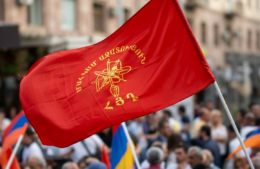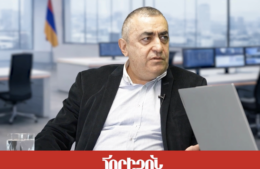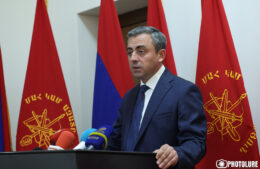Canadian Ambassador to Armenia Andrew Turner: ‘Canada Supports Armenia’s Sovereignty and Territorial Integrity’
- (0)
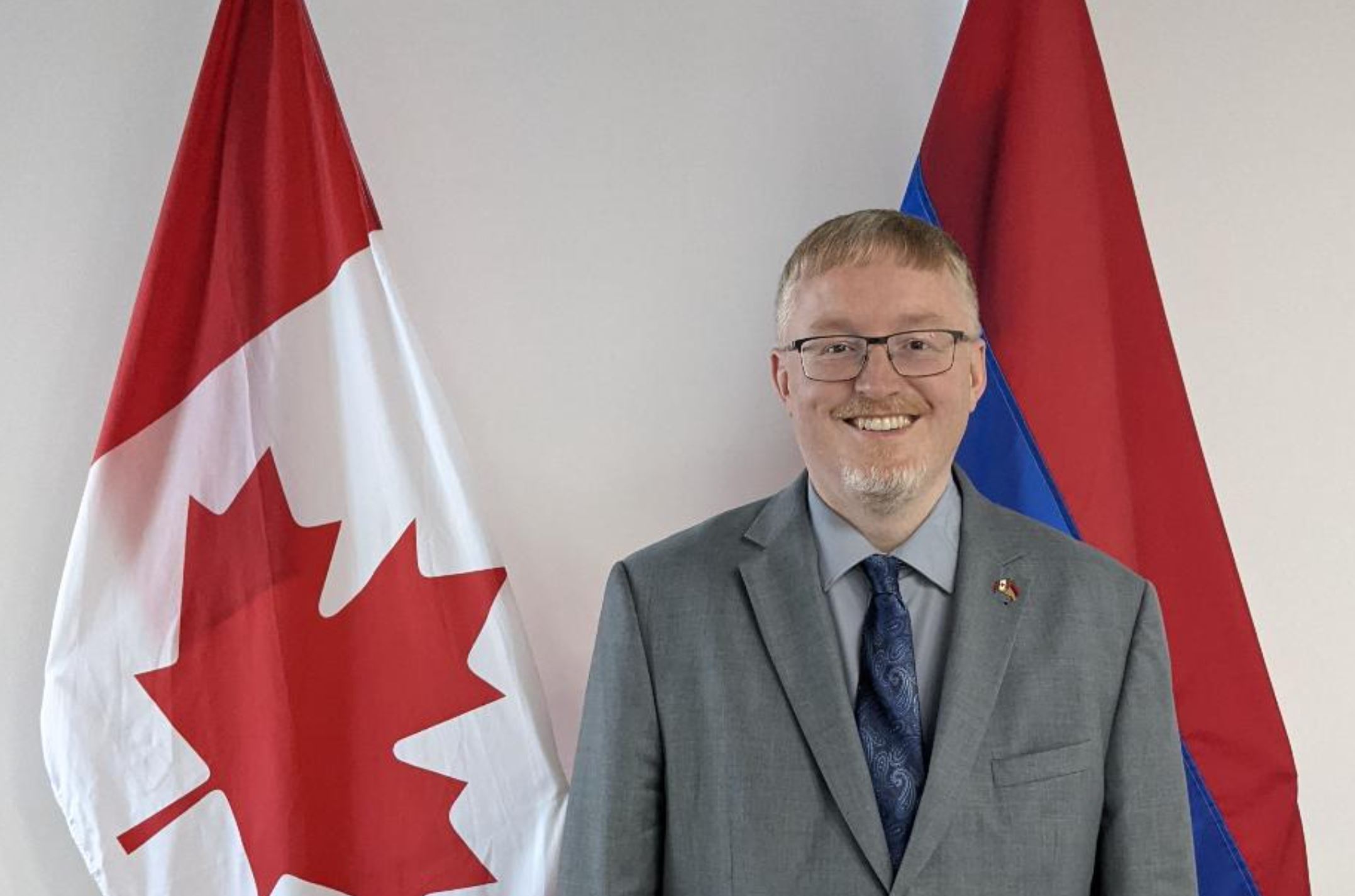
Horizon Weekly exclusive interview with Ambassador Andrew Turner
By Christian Garbis
-
In terms of the bilateral relationship, the Embassy’s opening was very well received. The Armenian people and the Armenian Canadian community have responded very positively, based on my meetings with the schools, community centers, and churches.
-
Canada has been very clear in its support for Armenia’s sovereignty and territorial integrity. Foreign Minister Melanie Joly made that a major focus of her visit.
-
As a historian, I learned not only about the Armenian Genocide but about Turkey’s efforts to suppress the historical study of the Genocide.
-
Canada has repeatedly and consistently spoken out about the need to preserve the cultural heritage of Nagorno-Karabakh. We’ve done so both bilaterally as well as multilaterally through UNESCO.
-
One of the initiatives put forth in the special report prepared by Stéphane Dion was the expansion of the Arnold Chan initiative for democracy. We have over the course of the past several years doubled the amount of funding provided for the initiative.
In an exclusive interview with Horizon, Andrew Turner, Canada’s first appointed ambassador to Armenia, discusses bilateral relations between the two nations and reveals how Canada will help Armenia develop further as a democratic society. He talks about how the Canadian government has pledged its humanitarian support for the Armenian refugees of Artsakh as well as its unwavering support for Armenia and Azerbaijan to finalize a peace treaty. He also highlights the importance for Turkey to recognize the Armenian Genocide and come to terms with the past in order to move forward.
– October 25, 2023 was a historic day for Canada and Armenia. The Embassy of Canada was inaugurated in Yerevan in the presence of Foreign Minister of Canada, Mélanie Joly. This followed the special report prepared by Stéphane Dion, the Prime Minister’s Special Envoy to the European Union and Europe, in April 2022. The establishment of a permanent mission will serve mutual interests in various realms, especially in increasing trade volume between the two countries. You are the first ambassador to the Republic of Armenia. What was accomplished during the past six months since the inauguration ceremony and what will be the main priorities of the mission?
The inauguration in October was indeed a very significant accomplishment. I had arrived shortly before to officially present my credentials. It was wonderful to have Foreign Minister Joly and her counterpart, Armenian Foreign Minister Ararat Mirzoyan, who took part in the official ceremony and flag-raising.
In the six months since then, we have made considerable progress in strengthening Armenian-Canadian ties and with the actual mechanics of getting the Embassy up and running. I think that there’s still much work to do, obviously.
The most important thing is that the office is up and running and we’re functioning. We’re actively engaged. We have our full contingent of Canadian diplomats and staff members that are permanently here and are actively working in different areas for strengthening ties. We’re hiring local staff as well. We hope to have a staff of four Canadians and nine locals on staff here in a few months. The office is functioning but there’s still construction to do, which will continue well into next year, but we’re off to a good start.
In terms of the bilateral relationship, the Embassy’s opening was very well received. The Armenian people and the Armenian Canadian community have responded very positively, based on my meetings with the schools, community centers, and churches. I have met with many Canadians who are working here, and sometimes I am randomly stopped in the street by Canadian Armenians who recognize me. They expressed how pleased they are that Canada has opened the Embassy.
That strengthening of the peoples’ ties has been very important. From a political perspective Canada has highlighted its support for Armenia’s sovereignty and territorial integrity. Of course, as positive as the opening of the Embassy was, it did come a few weeks after the September military operations by Azerbaijan to take nagorno-Karabakh and the forcible displacement of 120,000 people. Signaling the support for Armenia at such a critical time has been the main objective.
We saw this with Foreign Minister Joly’s visit, where she went to Jermuk and had the chance to meet with refugees directly. She had the chance to engage in the observer mission and to see some of the points of the territory that was being occupied and to convey a message of support publicly from Canada, which included the announcement of additional humanitarian assistance for refugees. Those messages of support were very well received.
We also tried to strengthen ties in a variety of areas, including strengthening democracy. We continue to work with civil society, the National Assembly, with the Human Rights Defender and the media. Now that we are on the ground we can do this in a permanent way.
We’ve also started work on strengthening ties in the cultural field, including Francofonie, and we’ve also tried hard to strengthen economic cooperation. Just in the last month we had the initial business delegation come from Canada to Armenia working with the Canada-Eurasia Chamber of Commerce to increase the commercial ties, and a memorandum of understanding was signed between the Canada-Eurasia Chamber of Commerce and the Chamber of Commerce and Industry of Armenia. So the areas of focus have been wide, from security, humanitarian assistance and democracy to culture and trade.
– Following Azerbaijan’s aggression against the Republic of Artsakh last year, Azerbaijan has continuously threatened the resumption of hostilities, making unfounded territorial claims against the Republic of Armenia. As a full member of the OSCE, Canada must take concrete steps to protect and advocate for Armenia’s territorial integrity and sovereignty and work alongside other members of the international community to establish an internationally sanctioned security zone along the entire Armenia-Azerbaijan border. What steps has been taken by the Canadian government on this issue?
Canada has been very clear in its support for Armenia’s sovereignty and territorial integrity. The Foreign Minister made that a major focus of her visit, as you mentioned. Even though she was here to attend the opening ceremony, in addition to the engagement she had while she was here, she was clear in all of her statements as I have in my public comments.
We are using our diplomatic efforts to encourage the peace process and negotiations between Armenia and Azerbaijan through bilateral discussions. We’re using our Embassy in Ankara to engage both with Turkey and Azerbaijan as well as using all the channels in the multilateral system, via the UN, the OSCE, and UNESCO. So we’ve been very active in highlighting our message.
We’re also taking other steps for more practical support, such as the deployment of Canadian observers as part of the EU monitoring mission, which is explicitly looking to provide greater confidence along the border. We’ve seen that there’s been progress in peace discussions between Armenia and Azerbaijan and we’re very happy to continue encouraging that.
– You know, from the Azerbaijani side, they do tend to use a lot of anti-Armenia rhetoric in their propaganda, in their statements to the Azerbaijani press and the public, and that’s getting out there. Do you feel that it’s problematic to have these anti-Armenia sentiments coming from them? It’s not very constructive given that both sides–especially the Armenian side–have been proactive in trying to have a peace treaty signed.
If you look at what Armenia has done in terms of the proposals they put forward for a peace agreement and Armenia’s Crossroads of Peace initiative–and conveying messages to the Armenian people that they will need to make concessions and territories will need to be exchanged–and other measures for the peace process, I think it is very clear that Armenia is strongly committed to peace and it has demonstrated that unequivocally.
Given that Armenia is a smaller country and has a weaker military position, and that it is further away from its allies, compared with Turkey and Azerbaijan, it is understandable that many people in Armenia are worried and nervous. In those circumstances it is important that Azerbaijan recognizes those realities and should be trying to engage as constructively as possible to move forward in the pace process.
To hear some of the more aggressive statements that have come out at times is not something that will help move the process forward. It is very understandable why many people in Armenia are worried and sensitive, particularly when you look at the recent precedent of some of the rhetoric that came out of Russia prior to the invasion of Ukraine, and that just reinforced those fears and worries.
So from our perspective we are very pleased that the two countries are participating in these negotiations and we are seeing progress in reaching tangible outcomes from these discussions, including the release of detainees and the ongoing process of border demarcation. These are things that should be the building blocks for further cooperation.
And so, when we see that aggressive rhetoric that sets the process back–no, that’s something we absolutely don’t view as being helpful. Both sides showing that they are committed and are trying to avoid aggressive rhetoric is going to have a much more positive impact on the success of the peace agreement.
– The Azerbaijani aggression against the Republic of Artsakh created an unprecedented humanitarian crisis in the region. With well over a 100,000 people being displaced and deprived of basic humanitarian needs, the region is in dire need of humanitarian assistance. Is Canada ready to provide additional aid to address humanitarian needs for the forcibly displaced people of Artsakh living in Armenia?
Canada is absolutely committed to supporting Armenian refugees from Nagorno-Karabakh. We have provided approximately $4 million of humanitarian assistance through the International Committee of the Red Cross (ICRC) and the United Nations Human Rights Council (UNHRC).
During Minister Joly’s visit she had the chance to meet directly with refugees to hear their stories, and that’s something I continue to do. In the last couple of months we had a visit from Jacqueline O’Neill, Canada’s Ambassador for Women, Peace and Security, who met directly with refugees to hear about the situation now several months on.
Now that the Embassy is open we actively continue to engage on a regular basis, through mechanisms like the Canada Fund for Local Initiatives, in finding ways of providing additional support.
Most importantly, we’re also continuing to provide support by consistently advocating for the right of the refugees from Nagorno-Karabakh to return. That right has to be respected, and if people choose to return on a permanent basis or temporarily to collect personal effects or sell property, their right to choose whether to return and for how long absolutely has to be respected.
As for the peace process, the detainees and many other matters, and the preservation of cultural heritage, these are points that Canada consistently raises not only in our discussions with Armenia to find out how we can provide support but in our diplomatic engagements with Azerbaijan and Turkey, and our broader engagement in the multilateral system.
– Armenian Christian monasteries, churches and cemeteries in Nagorno-Karabakh have been under Azerbaijani control since 2020. Will Canada commit to safeguarding the cultural heritage of the indigenous Armenian people of Artsakh?
Canada has repeatedly and consistently spoken out about the need to preserve the cultural heritage of Nagorno-Karabakh. We’ve done so both bilaterally as well as multilaterally through UNESCO, and we’ve had discussions on how we can play a role in supporting their work in preserving cultural heritage. This is something we absolutely think is essential.
I had the privilege of visiting Ejmiatsin to pay a visit to the Catholicos, and during that meeting I was shown some of the examples that the church had brought out of Nagorno-Karabakh to preserve them, and they really are remarkable, not merely for the important religious and historic significance but also from an artistic perspective. They are incredible to see. So I think it is absolutely crucial that they be preserved.
If you look at historic examples of regimes that have carried out this type of destruction, for example the Taliban destroying the Buddhas of Bamiyan monuments in Afghanistan, that has not reflected well on them. So we strongly encourage Baku to take all necessary steps for the preservation of cultural heritage. Canada has indicated that it is happy to work with UNESCO and others to ensure that.
– The late MP Arnold Chan was the chair of the Canada-Armenia Parliamentary Friendship Group and he was a staunch advocate of democratic values. A year after his untimely passing, in his memory Prime Minister Justin Trudeau announced the launch of the “Arnold Chan Initiative for Democracy in Armenia”. Since gaining independence Armenia has shown its commitment to strengthening its democratic standards, in a region marred by authoritarianism. Will it be possible for Ottawa to engage in strengthening democratic values in Armenia, such as securing full judicial independence in Armenia?
I had the privilege of meeting Arnold Chan’s family. One of the accomplishments of the last six months has been the increase in the number of parliamentary visits and exchanges that we have seen, which have included all the major Canadian political parties. I think it’s very important to highlight that support for strengthening Armenia-Canada ties is universally supported. It very much demonstrates the commitment that Canada has toward strengthening Armenian democracy.
This is absolutely the foundation for our engagement. We’ve had a very positive relationship with Armenia, particularly given the strong people-to-people ties between the Canadian-Armenian community and Armenia, for decades.
But I think it is in the last few years, with Armenia having embraced in a very significant way democratic reforms and increased focus on engagement with the West, that we have seen opportunities to increase our partnership. One of the initiatives put forth in the special report prepared by Stéphane Dion was the expansion of the Arnold Chan initiative for democracy. We have over the course of the past several years doubled the amount of funding provided for the initiative.
In addition, now that we’re on the ground, we’re able to interact and engage with a much broader array of civil society partners and identify projects to work on. That is a further demonstration of our commitment to strengthening democracy in all of our engagements with the government of Armenia. There still is a lot more work that needs to be done, and it is going to be key for Armenia’s ongoing engagement with Canada, the EU, and the US to see that sustained commitment to democracy and the continued progress in efforts related to human rights, rule of law, press freedom, and democratic elections.
All these things are hallmarks of our own experience of democracy in Canada. We are by no means perfect. You would find many Canadians who have a lot of criticism to make about aspects of Canadian democracy, and we certainly recognize that this is an ongoing process in all democracies, it is never finished. And so for a country that is still very early in its democratic development there obviously is still work that needs to be done and that is to be expected.
But what we are keen to see is that continued ongoing commitment, and we are pleased that that has been the case. The fact that Armenia has had successful elections, and that people have been able to express disagreements with policies, are positive signs, and we hope to see them continue.
– Justice for the Armenian Genocide will not be served until the current Turkish government recognizes the crimes of its past and delivers a just resolution to the victims and descendants of the Armenian Genocide. Canada has recognized the Armenian Genocide. Will Ottawa take more steps to urge the Turkish government to come to terms with its past and recognize the Armenian Genocide?
The Armenian Genocide is a historical fact. There is no denying it. Any serious historical inquiry into it would take only a matter of a few minutes to show how overwhelming the evidence is. As a country that has recognized the Armenian Genocide, Canada absolutely encourages all countries to follow suit.
In my previous role as the Director of the Eastern Europe Eurasia Division, I had regular meetings with representatives of Turkey. In discussions about the Armenian Genocide I regularly advocated for Turkey to recognize it. We see so many examples of how countries that are able to come to terms with dark chapters in their history can benefit and move forward. We can cite this directly in Canada’s own experience of the absolutely appalling and at times genocidal treatment of our indigenous population. I think it is to Canada’s credit that we are increasingly recognizing what we did and are formally issuing apologies to move forward and address the damage that has been done. I think we are coming out as a stronger country because of it.
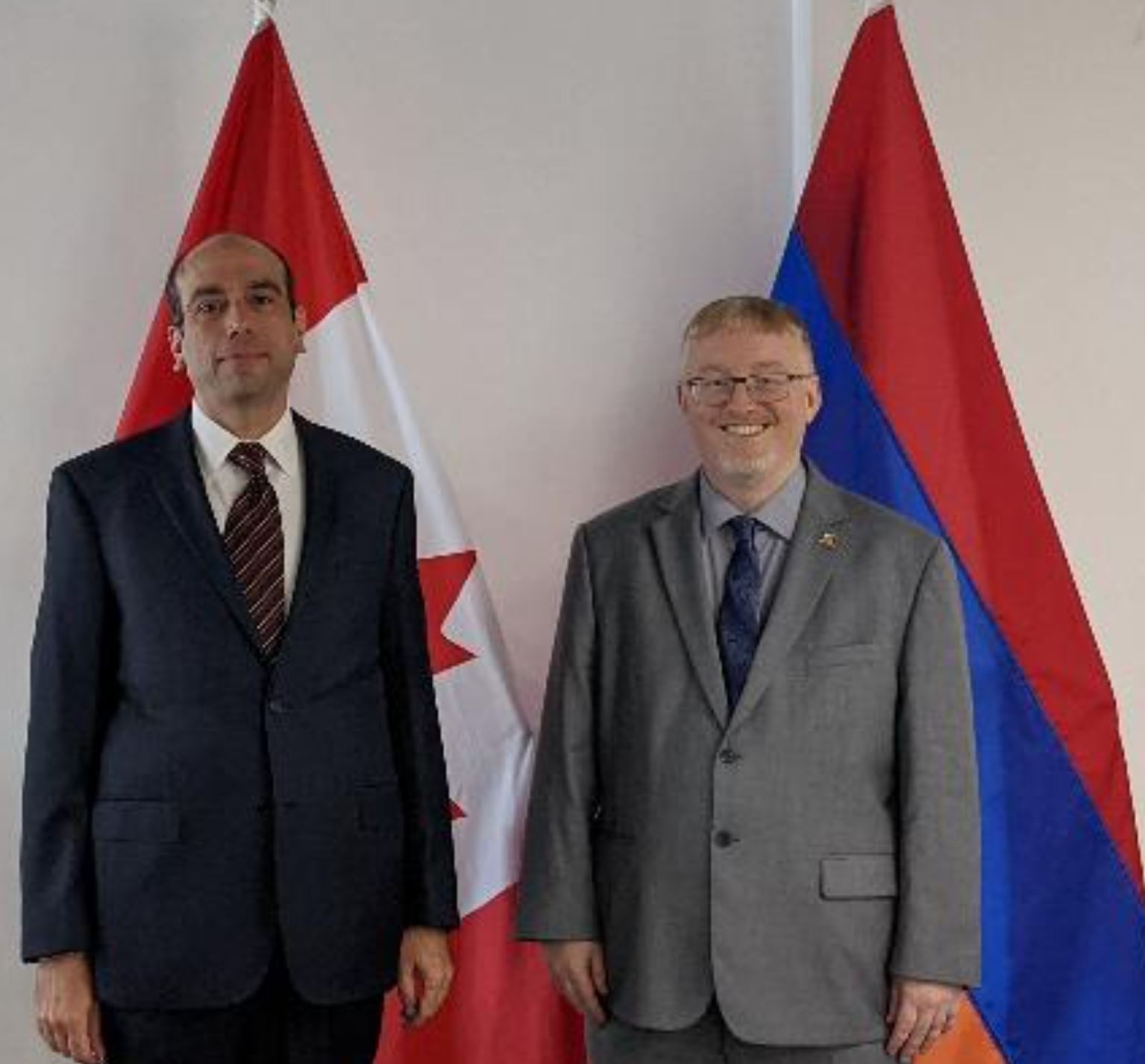
Obviously, it’s the decision of all countries, including Turkey, to make in terms of their policies on this matter. But Canada has very clearly made its position known and will continue to support recognition by other states.
I have a very strong personal attachment to this important issue. As a historian, I learned not only about the Armenian Genocide but about Turkey’s efforts to suppress the historical study of the Genocide. Prior to my joining the diplomatic corps, I had the chance to research and draft a speech for a Canadian Senator who spoke in favor of the recognition of the Armenian Genocide. I take great pride in that.
